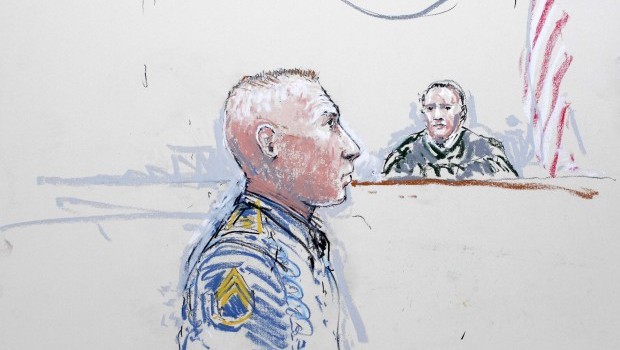
Army Staff Sergeant Robert Bales (L) and Judge Col. Jeffery R. Nance are seen in a courtroom sketch as he is arraigned on 16 counts of premeditated murder, six counts of attempted murder and seven of assault at Joint Base Lewis-McChord, Washington in this January 17, 2013 file photo. Source: Reuters/Peter Millett
Seattle, AP—The American soldier charged with killing 16 Afghan civilians during nighttime raids on two slumbering villages last year is expected to recount the horrific slaughter in a military courtroom Wednesday when he pleads guilty to avoid the death penalty.
Staff Sgt. Robert Bales faces premeditated murder and other charges in the March 2012 attacks near the remote base in southern Afghanistan where he was posted.
Most of the victims were women and children, and some of the bodies were burned; relatives have told The Associated Press they are irate at the notion Bales will escape execution for one of the worst atrocities of the Afghanistan war.
Under the terms of his agreement with Army prosecutors, Bales will plead guilty Wednesday at Joint Base Lewis-McChord, south of Seattle, and a sentencing-phase trial will be held this summer to determine whether he receives life in prison with the possibility of parole, or without it.
Bales’ attorney, John Henry Browne, said Tuesday he expects the judge, Col. Jeffery Nance, to question the soldier closely about what happened before deciding whether to accept the plea. It’s unclear whether Nance will make a decision Wednesday.
“Tomorrow is going to be about what happened, then in August is going to be a jury trial about why it happened,” Browne said. “Obviously, avoiding the death penalty is our No. 1 goal. We’ve accomplished that, assuming the judge accepts the plea, and we believe he will.”
Bales, a 39-year-old father of two, has signed a detailed stipulation of facts admitting his actions, Browne said. However, the document remains under seal, and the lawyer declined to provide details about it.
Browne said last week that Bales was “crazed” and “broken” but not legally insane at the time of the killings.
Although Wednesday’s proceedings will provide Bales’ account for the first time, survivors who testified by video link from Afghanistan during a hearing last fall vividly recalled the carnage.
A young girl in a bright headscarf described hiding behind her father as he was shot to death. Boys told of hiding behind curtains as others scrambled and begged the soldier to spare them, yelling: “We are children! We are children!” A thick-bearded man told of being shot in the neck by a gunman “as close as this bottle,” gesturing to a water bottle on a table in front of him.
Prosecutors say that before dawn on March 11, 2012, Bales slipped away from Camp Belambay in Kandahar Province, armed with a 9 mm pistol and M-4 rifle outfitted with a grenade launcher.
He first attacked one village of mud-walled compounds, Alkozai, then returned to the base, woke up a fellow soldier and told him about it. The soldier didn’t believe him and went back to sleep. Bales then left to attack a second village, Najiban.
The massacre prompted such angry protests that the US temporarily halted combat operations in Afghanistan, and it was three weeks before Army investigators could reach the crime scene.
Bales was serving his fourth combat deployment and had an otherwise good if undistinguished military record in a decade-long career. The Ohio native suffered from PTSD and a traumatic brain injury, his lawyers say, and he had been drinking contraband alcohol and snorting Valium—both provided by other soldiers—the night of the killings.
The case raised questions about the toll multiple deployments were taking on American troops. For that reason, many legal experts believed it was unlikely he would receive the death penalty, as Army prosecutors were seeking. The military justice system hasn’t executed anyone since 1961, but five men currently face death sentences.
“Any time you can strike a deal that saves your client’s life, I would call that a win,” said Dan Conway, a civilian military defense lawyer who is not involved in the case. “This is the right result for both parties.”
